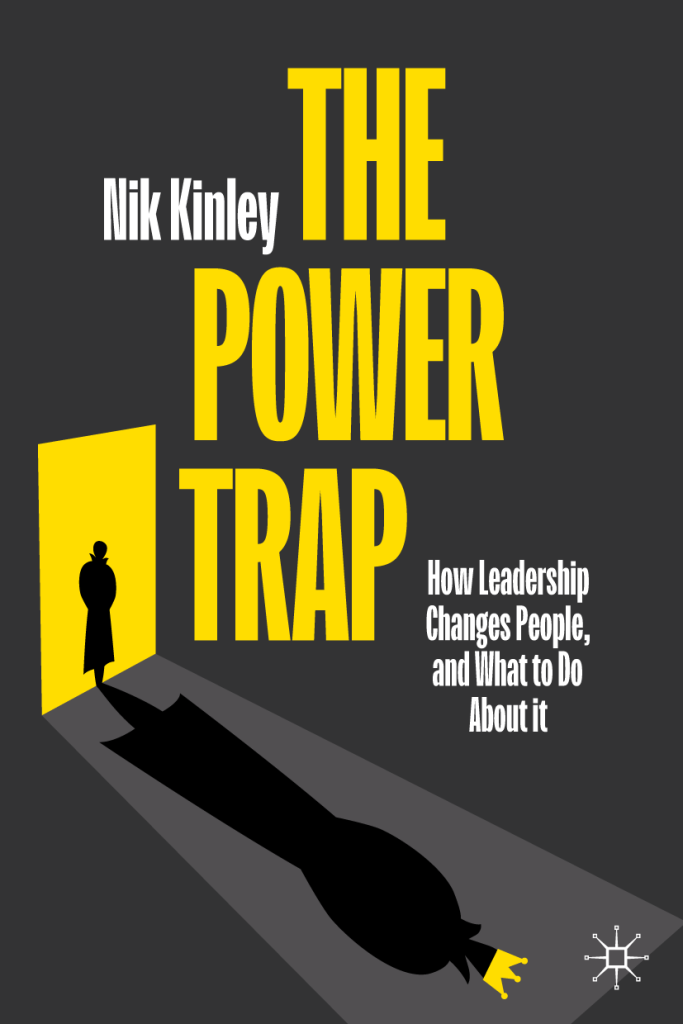In his latest book, Nik Kinley explains why your top performer might be the worst person to put in charge
If the history of leadership teaches us anything, it’s that we should be careful who we give power to. And yet, when we hire or promote someone for a top job, it’s rarely a consideration.
We tend to focus on what individuals are capable of and their ability to deliver results. On what they will bring to the role. And quite rightly, too, because these are critical things. What we don’t tend to explicitly consider is how individuals will react to having the extra power, authority and influence that comes with the role. On what the role will do to them.
It’s a critical distinction. Because having the right qualities to deliver results is fundamentally different from how power and status will affect someone. And thus, the type of leader the role will turn them into. And that’s a problem, because it is a core risk at the heart of any new leadership appointment, a too often underestimated risk, and – unfortunately – a growing one.
Capability v. suitability
There is some overlap between capability and suitability, of course, because if someone is strongly negatively affected by power, their ability to do their job well will eventually be undermined. But the important word in that last sentence was eventually. Because the negative effects of power usually take time to build up, and most of the time, they don’t result in the outright failure of a leader, but more in a gradual undermining of their performance.
And power will have negative effects. No matter how strong a performer someone is, every leader is changed to some degree by the position they hold. For starters, there is the way leadership psychologically distances every leader from the people they lead, reducing both leaders’ abilities to accurately gauge others’ perspectives and the degree to which people are willing to be open with them. Then there is the well-documented tendency for leadership to be an ego-booster, and thereby sometimes lead to overconfidence or hubris. While in some individuals, being the boss can feed hidden insecurities, driving defensive and overly dominant behaviours. Whatever the specifics, everyone is affected to some degree.

What organisations can do
So, what are the things organisations can do and look for to ensure that the leaders they select are not just the best short-term performers but also the ones most suited to holding power? It’s a complex subject because how much people are affected by power is the result of a combination of individual, situational and organisational factors. As a result, there are few definitive rules, but there are some general guidelines firms can follow.
- Talk about suitability. The key thing we need to do is to explicitly consider suitability for power separately from capability for role. We need to do this because, otherwise, all we tend to see is someone’s capability – whether they can do what we need them to. This means we need to think through what power will do to people and, through how they use it, the impact they will have on
the people they lead, the culture they create, and the positions they hold.
- Look for red flags, not green lights. Statistically speaking, it is easier to predict failure than success. That’s because no one trait is enough to ensure success, but it can be enough to cause us to fail. And it’s the same with power. It’s easier to predict who will react badly to it than who will manage it effectively. So, rather than focusing on who to select, we’re often better off looking at who to avoid.
- Look for the effects of power already there. If someone already displays behaviours that we know power tends to magnify, then that is usually a warning sign. So, things to look for include overconfidence, a lack of curiosity, a tendency to overgeneralise, a lack of insight into their impact on others, fear of failure, high need for clarity, moralistic judgement, being strongly emotionally led or informed by instincts, and impulsivity.
- Beware of extremes. Individuals who are extreme in any trait are likely to be very hit-and-miss in how they respond to different situations and pressures. That’s not to say that they’ll always react badly to power. But you’re usually taking more of a gamble with them.
- Think ahead. It often takes time for power to take a toll. So don’t just think about what someone is like now. Think about what they’re going to be like in a few years. (Most of the candidates I meet when assessing CEOs for roles could add value in the short term. It’s the medium and long term when weaknesses usually start to have an effect).
- Be wary of power need and expediency. Having either a very low or high need for power is associated with poorer moral judgements. Specifically, more expedient behaviour and a tendency toward black-and-white, generalised moral judgements. Actually gaining power then tends to make this worse.
- Beware of impression management. People who seem strongly sensitive or concerned with how others view them and engage in a lot of impression management are often negatively affected by power. That’s because their sensitivity is almost always created by insecurity of some sort, which in turn means they are more likely to react defensively to any perceived threat to their power (such as negative feedback or having their thinking questioned).
A growing need to act
Selecting leaders isn’t easy at the best of times. The failure rates of senior leaders are evidence enough of that. But the situation isn’t helped by the fact that we don’t more openly talk about and focus on power and the effects it can have on people. And if firms don’t act to change this, then the situation isn’t going to improve. In fact, it’s liable to get worse.
Maybe there was a time when power was less toxic, and there were more checks and balances in place, when suitability for power was only 20-30 percent of what mattered. But as leadership roles have become more exposed, less secure, and more pressurised, the negative effects that power can have on people have intensified. And with this, the importance of individuals’ ability to deal with these negative effects has increased dramatically.

Of course, selecting the right people is only part of the solution. It needs to be accompanied by investing in better preparing leaders for how power can affect them, as well as providing them with better training and support to deal with its effects.
There’s always an element of risk when appointing someone to a new role, of course. But given the potential costs of getting senior selection decisions wrong, ignoring a major source of that risk in our decision-making seems unwise. We won’t get it right every time, but by more explicitly considering suitability for power, we can at least minimise our mistakes.
Nik Kinley is a London-based leadership consultant, assessor and coach with over 40 years’ experience working with some of the world’s biggest companies. An award-winning author, he has written eight books, the latest of which is The Power Trap: How Leadership Changes People and What to Do About It, available now.






